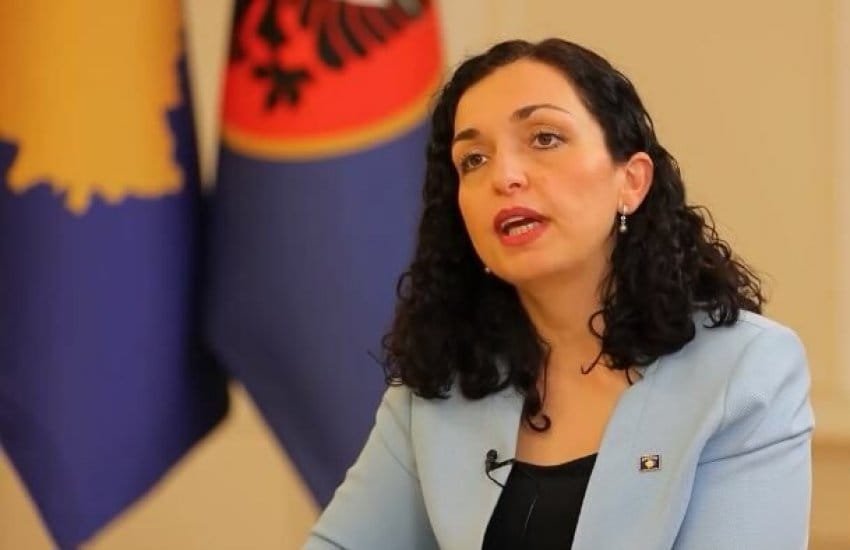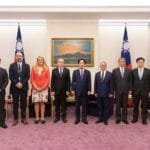The President of the Republic of Kosovo, Vjosa Osmani, said that Kosovo does not oppose the implementation of its obligations, but seeks a binding agreement for both Kosovo and Serbia. In an interview with Voice of America from New York, where President Osmani faced the President of Serbia yesterday at the Security Council meeting on Kosovo, she said that Kosovo will turn to the Constitutional Court for the status of the Association after an agreement has been reached on how to implement the acts stemming from the Agreement signed in Ohër by Kosovo and Serbia last year.
Voice of America: President Osmani, senior US officials – Deputy Secretary of State O’Brien two days ago in Belgrade and the US representative today at the UN, called on Kosovo to establish the Association. How will you respond to this call?
Vjosa Osmani: Kosovo has consistently shown willingness to implement the agreement reached in Brussels in February of last year and the annex of March of last year in its entirety and as soon as possible. But as in any other agreement, implementation has a plan of implementation or sequencing, which is still being negotiated in Brussels and envisages both parties, in parallel, to implement the agreement or its parts.
In this context, the agreement does not only have the Association clause; it also has other clauses, which, among other things, require Serbia to recognize the sovereignty and territorial integrity of Kosovo, not to use violence as a means or force as a means for interstate relations, and in Article 4 it requires not to create obstacles or oppose Kosovo’s membership in international organizations.
So, all Kosovo is asking for is for the agreement to be fully implemented and not just to demand full implementation from one party, while on the other hand not to demand the implementation of any of the provisions. Of course, we know that this is an international obligation of Kosovo, but there are some principles that we take into account and have as red lines in the implementation of the Association. Among them is the Constitution of Kosovo, the decision of the Constitutional Court of 2015, the fact that it cannot have executive competences, as written also in the letter of the [former High Representative for Foreign Affairs and Security Policy] Mogherini at the time, and also to be in line with the American stance published in ‘op-ed’ Cholet/Escobar.
So Kosovo is not opposing the implementation of its obligations. We are simply seeking that the agreement be an agreement and create obligations for both parties, because otherwise both the agreement and the dialogue lose their meaning.
Voice of America: Since your country’s international partners are calling on Kosovo to implement the Association, does Kosovo have a plan for the next steps?
Vjosa Osmani: The plan is clear, of course. The sequencing agreement must be concluded, which determines which step of the implementation should be taken first, which second, and so on. Once the sequencing plan is finalized, Kosovo, as foreseen in the Constitutional Court decision of 2015, must submit the draft statute to the Constitutional Court. Then it is up to the Constitutional Court to decide whether the draft is in line with the Constitution of Kosovo and the Constitutional Court’s ruling.
As President of the country, I have a number of concerns about the draft, but I have full confidence that the Constitutional Court will ensure that everything is in line with the Constitution and the 2015 ruling, because otherwise I think many things could be misused in practice during the interpretation of the statute and major problems could arise, which would then be difficult to manage without creating tensions. So also for the sake of security, which is necessary for stability, which is a prerequisite for peace, but above all because we must preserve the functionality of our state, we must be sure that everything is in line with the Constitution before steps are taken for the full implementation of the Association.
Voice of America: Is it expected that the statute that the international community has given to Kosovo for the Association will go to the Constitutional Court soon?
Vjosa Osmani: I cannot determine deadlines. According to the statute but also the Constitutional Court ruling of 2015, this is a duty of the government of Kosovo. So it could be the relevant ministry or a government decision, but this also depends a lot on the flow of dialogue. As I mentioned, there must be a sequencing plan, which clearly foresees which step Kosovo takes first, which step Serbia takes at the same time, so that both parties implement in parallel and both parties benefit.
But we cannot ask Kosovo to implement the main part of the agreement, while from Serbia, let it be, not to ask to vote pro in the Council of Europe. If implementation is required, it must be required from both, as I said, otherwise the credibility of the dialogue and the principle of equal treatment of parties no longer make sense. Because in a way, only one party remains in the process, as the other has already formally withdrawn by sending a letter to the EU that it will not implement the agreement. And Vučić said the same today in the Security Council, that they want the Association, but without taking any steps towards reciprocal recognition, either de facto or de jure in relation to Kosovo. In fact, the agreement has all the elements of de facto recognition, from the recognition of sovereignty and territorial integrity to other principles of the UN Charter, which are only valid among states. But they are clearly saying they will not implement it.
In a way, only one party remains in this agreement.
Voice of America: Madam President, if Serbia continues not to fulfill other parts of the agreement, does this mean that you will not move? That the government of Kosovo, the authorities of Kosovo, will not move forward with the implementation of the Association?
Vjosa Osmani: My position, as President of the Republic, is that since we know very well Serbia’s history and it constantly violates the agreements it signed and does not implement them on the ground, we must adopt an approach that we had around the time Kosovo declared independence, when Kosovo made a number of concessions, which did not make it a dysfunctional state, but were difficult concessions. But on the other hand, Serbia has not accepted to implement the Ahtisaari package. But what we have gained in return, has been the independence of Kosovo, the recognition of Kosovo and membership in international organizations.
So, if together with our international partners, we see that this principle of two parties in the process is failing, then we must sit down primarily with the United States of America, but also with the European Union states that have recognized Kosovo and we must make a clear plan. If Kosovo implements all these concessions, then what measures will the international community take to support Kosovo? Let’s say, is NATO on the table? Is candidate status and then rapid progress towards the EU, based on the reforms we have made, on the table? So, a kind of agreement between us and our partners is an issue that I have been discussing for a long time with partners, especially with the USA, always knowing that we will come to this point and Serbia again will not implement anything.
So, we need to see what we can get if we implement, but what we can get from our partners as a kind of support for the strong consolidation in the international arena of the Republic of Kosovo, as an equal state with others. Of course, as long as Russia has the right of veto in the United Nations, it is difficult. But any other organization where Russia does not have a veto, I believe it is possible to push through Kosovo’s state agenda, which is recognition and membership in international organizations.
Voice of America: And why do you think it is important to be so firm in this process, not to retreat from some of these principles that you have mentioned, such as reciprocity, and to demand this two-party process? Why is it important for you, for Kosovo?
Vjosa Osmani: It is important because we see that Serbia continues to commit aggressions against Kosovo. It is enough to mention the recent declaration of Vučić that Kosovo will never become a member of the United Nations, that it will not become a member of the United Nations until Serbia becomes a member of the United Nations, or that we are children of the Ottoman Empire, that we do not have the right to have an independent state. So, Serbia has not changed its policy towards Kosovo, on the other hand, there are also clear geopolitical interests of some major powers in Kosovo.
But we also see the two-party process and reciprocity as essential for our European future. Without this, it is not clear what kind of process this is and why we are involved in this dialogue. Because dialogue is not an end in itself. Dialogue should lead to a concrete result, that is, the recognition of the Republic of Kosovo by the Republic of Serbia. And if it is not clear that this is the direction, then I am not sure that Kosovo is interested in participating in this process.
So, we are interested in the dialogue and in a normalization of relations with Serbia that would result from the recognition of the state of Kosovo by Serbia. Otherwise, if Serbia continues with its tactics, of course, it is free to do so, but then it is not clear why we are in this process and why we are making concessions, while Serbia continues not to implement anything.
Source: Botasot.net







